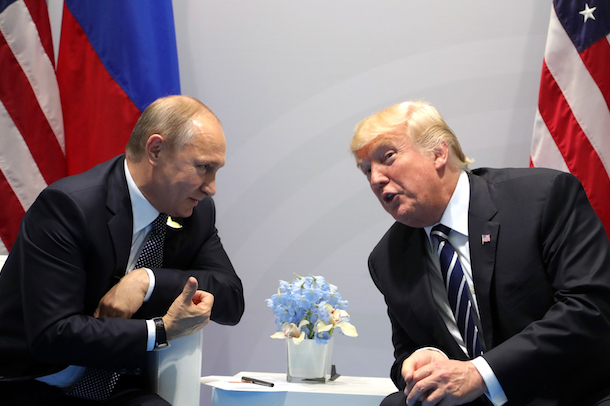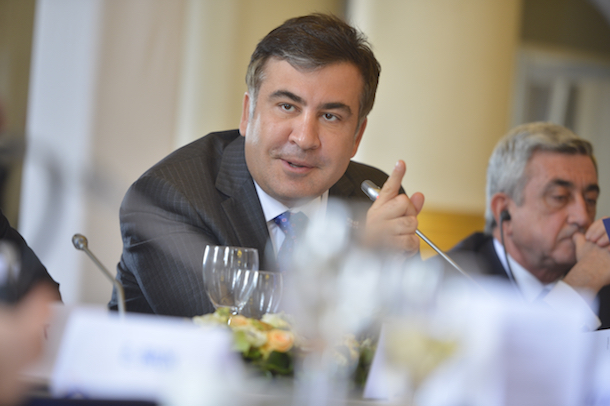
Putin is Literally Moving Georgia’s Border
In the short time that has passed since 2014 when the Russian army invaded Crimea, evicted the Ukrainian army, declared the peninsula an independent republic, and installed a pro-Russian puppet government, the world has changed quite a lot. For starters, the Group of Eight or G8 was reduced to the Group of Seven when Russia was expelled for its bellicose actions. The former Soviet republic had economic sanctions put in place against it and was censured by then-U.S. President Obama in the form of having members of their diplomatic corps kicked out of a couple of U.S. mansions which they were accused of using as bases for spying.
And the recent G20 meeting the much-anticipated face-to-face meeting between current U.S. President Donald Trump and Russian President Vladimir Putin appears to have come off with more of a whimper than a bang, at least from the perspective of Putin. Trump and his staff certainly made it clear that the U.S. will continue to side with the freedom-seeking peoples of the former Russian satellites, especially when it comes to the thorny issue of the Russian invasion of sovereign Ukrainian territory, as well as the ongoing conflict in Georgia. The overall sense that Russia is still regarded as a nation that is persona non grata on the world stage continues to be reported in most of the world press.
Which is a relief to thoughtful people who were concerned that Putin’s efforts to rehabilitate his image just a few short years after invading a neighboring country might have been paying off. The war crimes committed by Putin and his thugs in the Crimean peninsula are bad enough; it would be unconscionable for the nations of the world to forgive them–if for no other reason than that he continues to recklessly flout the accepted rules of international law.
Because the truth is, to understand the machinations of the ex-spy who now controls the kleptocracy that is the modern Russian state, to see just how devious and brutal the Russian president and his cronies really are, one need look no further than Russian relations with neighboring Georgia. And the sad fact is, although there was an outcry over Crimea, the world at large has mostly ignored the plight of neighboring Georgia, and Putin’s depredations against it. This neglect is a forlorn testament to our reduced collective attention span in this day and age.
History
So what of Russia and its neighbor Georgia? What is the media missing when it ignores the injustice that is being carried out there every day? Especially when you consider that the U.S. has long supported Georgia’s efforts to join NATO and integrate itself into the world economy, how can we better understand the ongoing conflict when it comes to Russian encroachment and the Georgian people? What steps might President Trump take moving forward in order to further the amicable relationship between the U.S. and Georgia?
First a little history. They say you can know a man’s character by how he treats those less fortunate than himself. If that’s true we have seen ample evidence of the true character of Russia’s ruling elite in the manner by which they have treated Georgia.
The war of aggression Russia waged against Georgia in 2008 was short but exceptionally ugly. Russian troops invaded and occupied South Ossetia, a region along the border between Georgia and Russia, and even bombed the civilian Tbilisi airport and advanced ground troops to within a few miles of the capital city. Were it not for 11th-hour negotiations and a peace deal put forward by former French President Nicolas Sarkozy, the casualty rate might well have been much higher, perhaps even approaching the kind that comes with a mushroom cloud.
Despite a long history of the international community–including Russia–recognizing South Ossetia as part of Georgia, in 2008 Putin convinced them to secede and declare themselves an independent nation. He then installed a puppet regime that is almost completely dependent on the Kremlin for their economic survival. To date the region continues to be occupied by thousands of Russian troops.
Current Situation and Border Creep
So that’s where we’ve been. Where are we now, in terms of the relations between Russia and Georgia?
For starters, the fragile peace there is constantly under threat from Russia. Even today, while the world’s attention is on other matters, the Russians violate the terms of the nearly decade-old peace treaty by refusing to allow international observers into South Ossetia. What’s more, they continue to refuse to withdraw troops to pre-war locations, as Georgia has already done. And despite international condemnation of these clearly illegal actions, Russia continues to defy other international norms in an even more alarming fashion.
One of the biggest threats the Georgians see is that Russia is literally moving the border of the internationally unrecognized entity South Ossetia ever-deeper into Georgian territory. The barbed-wire topped fence that serves as the administrative separation between the two has been pushed repeatedly into Georgia, with little or no outcry from the international community.
The fact that the Russians can continue to unilaterally adjust the barbed-wire fence farther and farther into Georgia with seemingly no compunction about the world knowing exactly what they are doing is especially troubling. Putin and his cronies seem content to adopt a “might makes right” attitude, despite the fact that Russia is a signatory nation to numerous treaties prohibiting such actions.

Since Russia has occupied South Ossetia, which it has so deceptively put forward as an independent nation–this, despite the fact that only Russia, Venezuela, Nicaragua and Nauru recognize it as an independent entity–the South Ossetian administrative border fence’s movement at the behest of the Russians has advanced so far that it is actually approaching Georgia’s main highway connecting east and west.
Even worse, at least for the villagers living nearby, the border creep has actually divided residents within individual towns from one another. According to the Georgian Ministry of Defense, the areas inhabited by ethnic Georgian residents of two villages, Greater and Lesser Khurvaleti, have been partitioned into opposite sides of the “border.” Two other villages, Zardiantkari and Roreti have also been similarly divided, according to reports in the Georgian media. In addition, parts of nearly half a dozen additional villages have been seized by the Russians by way of simply moving the fence that delineates the administrative border and occupying the newly grabbed territory with Russian troops.
What is important to keep in mind with regard to the border creep situation in Georgia is that these changes in who controls the territory are not mere cosmetic issues. These changes are far more portentous than, say, which mailman will be bringing your letters.
When the original conflict between Georgia and Russia took place in 2008, thousands of ethnic Georgians were forced to flee from their homes when South Ossetia asserted its independence at the behest of the Russians. As many as 135 areas saw their Georgian residents chased out by the occupation regime. So when Russia arbitrarily and unilaterally moves the goalposts as it were, there are real-world consequences for innocent people. Indeed, many Georgian residents of these towns and villages along the new border have lost access to areas they formerly used every day.
It has also recently come to light that the Ossetian separatists and the Russians have been using Soviet-era maps to determine where the border should be. These maps, published between 1976 and 1986 were obviously drawn up without the benefit of modern technology like GPS mapping and thus the information they purport to show is highly suspect. They are being used deliberately to provide favorable cover for the Russian troop movement into Georgian territory.
Russian propaganda
So how are the Russians getting away with all this? With such brazen violations of international norms how is it possible that all this has gone largely unnoticed?
Studies of the ways the Russians’ propaganda has evolved over time look at how the installation of a former KGB boss as president in the person of Vladimir Putin has taken the Russian propaganda game to shocking new heights of sophistication and cruelty, both domestically and internationally.
The first thing to understand about Russian propaganda is that we can separate it into two variants: hard and soft propaganda.
Americans and anyone else living outside Russia’s sphere of influence are likely to be much more familiar with the soft propaganda efforts of the Kremlin, for example the use of state-controlled information arms like Sputnik and Russia Today, as well as social media platforms like Facebook and Twitter to disseminate misinformation that is favorable to the interests of Russia.
While Georgia has increasingly become more aligned with Europe and the EU through the recent negotiation of a liberalized visa policy and continuing talks about NATO membership, Russia uses methods old and new to attempt to drive a wedge between them.

One angle the Russian propagandists play with ever-increasing sophistication is the use of historic cultural ties between Russia and Georgians. Georgia is in particular a more strongly religious country than its neighbors, and Russia hammers this important distinction home by continually portraying the west as sinful and overly liberal, suggesting Georgians would be better off sticking with Russia’s “traditional Christian” values. And in the wake of the Brexit vote and the instability of the EU’s future with regard to the U.K., Russian propagandists favor presenting the EU as a failing project that would do little to help Georgians on the ground.
NATO membership too is portrayed unfavorably by the Russians in terms of the floundering of the NATO nations in various military misadventures around the globe. Indeed the military prowess of the west in general is belittled more and more, with the examples of Crimea and more recently the bumbling way the U.S. and its allies have run into a dead end in Syria.
Russia is portrayed in these and other narratives as strong and unassailable, while those who oppose it are seen as weak and ultimately doomed. Indeed, of the 43 television channels available on Georgian television service MagtiSat, fully 20 of them are Russian language channels and are widely believed to be disseminating pro-Russian propaganda that is anti-Western, homophobic, and promotes violence.
This is perhaps where the border between soft and hard propaganda lies. Hard propaganda comes down to the “realpolitik” way Putin and the Russian state intimidate and simply roll over any and all opposition, for example the way they are moving the border between South Ossetia and Georgia, and building up their military presence there. The clear message the Georgians are meant to get from these actions and the behavior of Russian military in Crimea and Syria is that Putin is a strong, decisive leader, unafraid to resort to using his military might against those who dare oppose him. Intimidation and barely-veiled threats are the tools of hard propaganda, and Putin wields them masterfully.
The Future
So where does that leave Georgia, and what does the future hold?
In order to even begin to address this, we must first understand exactly where Russia’s hostility toward Georgia comes from. For one thing, it cannot be stressed enough that the Russian economy Putin has molded in his time as president is more akin to that of a criminal gang than a nation. And the reason that he sees Georgia as such a threat is that it has become so very attractive to outside investors who are appreciative of the stability offered there. The World Bank has continued to praise Georgia in terms of its reforms and holds up its economic development as a model for other developing nations to successfully assert their independence.
And for entities like the World Bank, corruption is one of the biggest roadblocks to a developing nation coming into its own. On the other hand, for strongmen dictators who run nations that are barely disguised criminal organizations, corruption is a key element to maintaining control and of course, profiting.
An independent Georgia aligned favorably with the EU and NATO is thus a tremendous existential threat to someone like Putin. He will not hesitate to use his lackeys in the Russian-controlled media as well as his military, and he will surely stop at nothing to harass, hamper and otherwise interfere in Georgia’s internal affairs–internal affairs which, let’s not forget, also included the affairs of South Ossetia until very recently.
For westerners still not convinced of the deviousness and aggression of the newly emboldened Russian bear, the lesson of what is happening to the state of Georgia should provide a stark lesson. Not only that, as people who live in a country that calls itself “The Land of the Free,” we should not only be aware of the plight of the Georgians, we should be shouting about it from the rooftops.
Indeed, a massive youth protest is already underway and is scheduled to peak on July 14 to draw attention to the Russian encroachment into sovereign Georgian territory. A new border sign was illegally placed in the village of Bershueti, a recent move that saw Georgia lose about an additional ten hectares of its territory to Russian occupation and has drawn the ire of residents there.
Russian encroachment on sovereign Georgian territory is a vicious violation of international norms that must not be tolerated. Indeed, President Trump’s cold shoulder to Putin at the G20 is a hopeful sign that the U.S. will step up its condemnation of the illegal Russian occupation of Georgian territory.
If we don’t stop Putin now, will we be able to stop him in the future?
Where will it all end?

